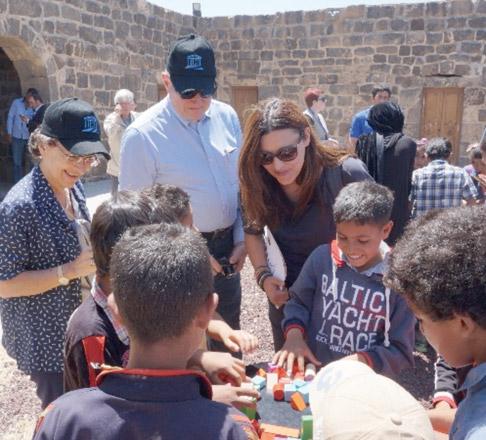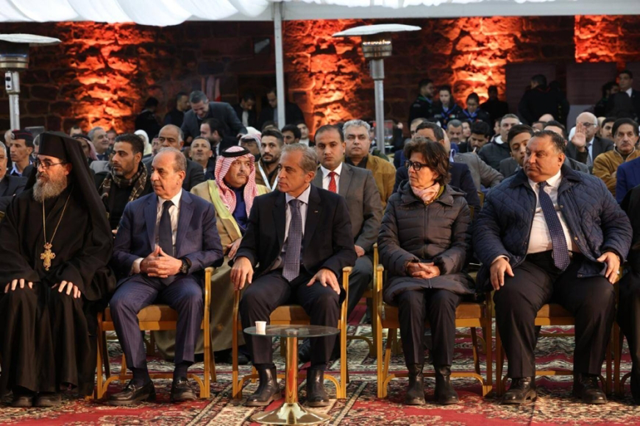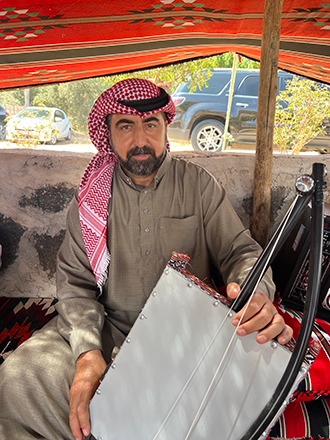You are here
Empowered ‘Ladies of Umm Al Jimal’ set up entrepreneurial activities
May 31,2017 - Last updated at May 31,2017

Costanza Farina, Francesco Bandarin and Marisa Matias enjoy children’s heritage education activities at Umm Al Jimal recently (Photo courtesy of UNESCO)
AMMAN (UNESCO) — The women involved in a joint programme initiated by UNESCO in partnership with UN Women recently had the opportunity to showcase their work for guests.
The European Parliament delegation for relations with Mashreq countries was in Jordan for a series of meetings and was eager to explore the Kingdom.
The joint programme “Empowering Rural Women in Mafraq Governorate” focuses on supporting women through a human rights-based approach to socio-economic development.
The programme has enabled the women’s association “Ladies of Umm Al Jimal District” to set up entrepreneurial activities catering to tourists at the archaeological site of Umm Al Jimal, offering a combination of hospitality services, handicraft production and informal tour guiding.
In addition to these visitors, UNESCO representative to Jordan, Costanza Farina accompanied Francesco Bandarin, UNESCO assistant director general for culture, to the Umm Al Jimal archaeological site.
Together, all guests embarked on a tour of the beautiful ruins. While at the Umm Al Jimal archeological site, the visitors were able to observe children from schools in Umm Al Jimal engaged in informal heritage education activities set up through the programme and carried out by a team of local women, through the Ladies of Umm Al Jimal District.
These activities aim to stimulate cultural interest in the archaeology and history of the site, encouraging its sustainable preservation. For example, the visitors observed the children engaged in a hands-on activity demonstrating the geological force of the earthquake that rocked the Umm Al Jimal area in AD 749.
To conclude their visit, the guests had the opportunity to purchase some of the women’s basalt carvings and were treated to snacks also prepared by women. A short video summarising the key aspects of the programme was also screened.
Umm Al Jimal is one of the oldest and best preserved Byzantine towns in Jordan. The black basalt stone spread throughout the desert landscape known as the “Haurani Plateau” provides a medium for the enterprising Syrian and Jordanian artisans who began to develop rock art in 2013.
Artisans Umm Mahmoud and her teenage daughter Muna explain that before the project, they did not possess skills to create rock art. They have learned to love sitting beneath a tree, creating new pieces. Muna was married at 15 and, with two children to support, the income she generates by selling her work is indispensable.
UNESCO and UN WOMEN have also assisted the women in attracting more tourists by developing “Umm Al Jimal Gourmet”, a service that provides traditional bedouin food to visitors. Their new restaurant will officially open in a few weeks, across the street from the archeological site and directly above the store-front they now use to sell their carvings.
The programme also includes a key component focused on women’s rights and empowerment, an element crucial to the promotion of a gender-responsive business environment in Umm Al Jimal.
Supported by the Embassy of the Kingdom of the Netherlands in Amman and UN WOMEN, the project was developed in response to the significant poverty and gender marginalisation challenges in the Mafraq Governorate, 80km northeast of Amman.
While great strides have been made during the past three years, the progress will only be cemented with further donor support as the women work to continue to develop their skills and potential. To this end, UNESCO is currently seeking new partners.
If the project does not continue, Muna reflects: “We risk losing the sense of community we have developed with other women and forfeiting the income we have become accustomed to contributing to our families. It would be devastating.”
The women are united by a common vision of a better future for themselves and their families and, together, they represent a concrete example of culture acting as a source of resilience.
Related Articles
AMMAN — A collection of handicraft products of women artisans from the local community of Um Al Jimal will be launched on Monday at the Jord
AMMAN — Prime Minister Jafar Hassan lit the Christmas tree on Monday at the Umm Al Jimal archaeological site in Mafraq, which was added to t
AMMAN — In the heart of Umm Jimal, a community of 45,000 residents are making a living through selling handicrafts and engaging in the touri













